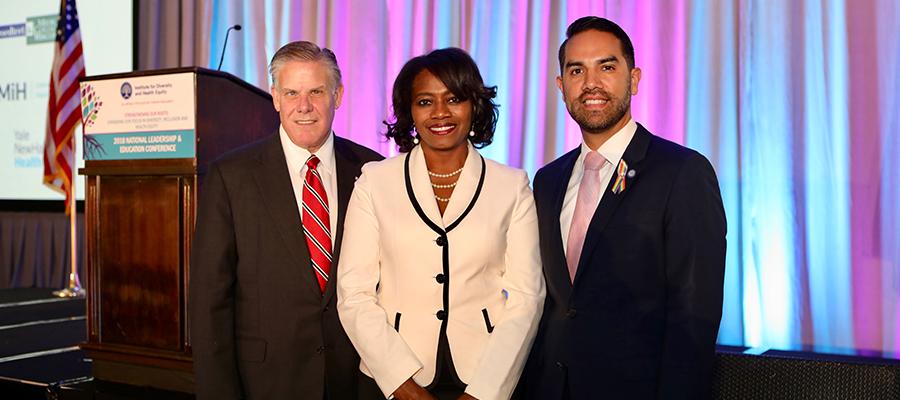Pollack Emphasizes AHA Commitment to Health Equity, Diversity and Inclusion at Conference

AHA President and CEO Rick Pollack opened the Institute for Diversity and Health Equity’s National Leadership & Education Conference today by affirming the AHA’s commitment to health equity, diversity and inclusion.
He noted the association’s efforts to increase access to care in vulnerable communities, stabilize insurance markets, rein in drug prices, expand Medicaid and defend patient protection, and eliminate racial and ethnic health disparities.
Pollack also made the business case for diversity and inclusion in health care, noting that success in a fee-for-value reimbursement environment requires embracing diverse patient populations, having a diverse and culturally competent workforce, and addressing disparities of care, which are all part of “redefining the H.”
“The bottom line: Hospitals that are able to do this will have a competitive advantage,” he said.
Pollack also announced the AHA’s support of the Health Equity and Accountability Act of 2018 – comprehensive federal legislation designed to eliminate health disparities and promote health equity. He highlighted provisions that would: bolster cultural competency training in medical education; increase funding for to health professions schools in minority-serving institutions; improve health care career opportunities for people of color; ensure Food and Drug Administration vigilance and labeling to guarantee safety and efficacy of medicines for all populations; require the federal government to address maternal and infant health disparities; increase funding to strengthen access to health information technology in minority communities;; and establish federal interagency programs to address social determinants of health, including housing, transportation and food security.
Pollack urged conference attendees to continue to partner with public and private-sector allies to drive home these benefits. Safe neighborhoods and schools; education and health literacy; access to healthful food; and various other social supports underpin population health, Pollack said, accounting for 80% of health outcomes.
“Without making progress in addressing the social determinants, we cannot make real progress in addressing health care costs,” he said.
Institute Interim President and CEO Cynthia Washington welcomed attendees to the conference and set the stage for the two-day meeting by sharing her own story of the high-mortality rate she faced as an African American woman born prematurely in the 1950s. Although health care has come a long way, "now is our time to strengthen our commitment, enhance our relationships with community organizations and collaborate with nontraditional partners," Washington said to attendees. "We need thought leaders and subject matter experts like you to amplify our efforts toward addressing health inequity."
Other highlights from today's conference included:
- Michael Steele, former chairman of the Republican National Committee, former Lieutenant Governor of Maryland, MSNBC Political Analyst, and president and CEO of The Steele Group, shared his personal story and discussed the current political climate and the impact to America.
- A panel discussion moderated by Institute Chairman Nicholas Tejeda, market CEO of The Hospitals of Providence in El Paso, Texas, featuring representatives of the Institute's founding members. Fred Hobby, past president and CEO of the Institute; Deborah Bowen, president and CEO of the American College of Healthcare Executives; Richelle Webb-Dixon, president of National Association of Health Services Executives; and Michael Rodgers, senior vice president of the Catholic Health Association of the United States; discussed the history of their organizations' early commitments to diversity, present-day work related to inclusion and the future ahead for health equity.
- Michellene Davis, executive vice president and chief corporate affairs officer of RWJBarnabas Health in New Jersey, discussed how the health system is addressing the social determinants of health and investing its community.
- Discussions on topics, including community partnerships, diversity in leadership, culturally competent care, social determinants of health and health equity data.

